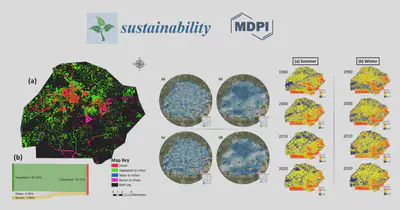Towards Sustainable and Livable Cities: Leveraging Remote Sensing, Machine Learning, and Geo-Information Modelling to Explore and Predict Thermal Field Variance in Response to Urban Growth
Abstract
Urbanization-led changes in land use land cover (LULC), resulting in an increased impervious surface, significantly deteriorate urban meteorological conditions compromising long-term sustainability. In this context, we leverage machine learning, spatial modelling, and cloud computing to explore and predict the changing patterns in urban growth and associated thermal characteristics in Bahawalpur, Pakistan. Using multi-source earth observations (1990–2020), the urban thermal field variance index (UTFVI) is estimated to evaluate the urban heat island effect quantitatively. From 1990 to 2020, the urban area increased by ~90% at the expense of vegetation and barren land, which will further grow by 2050 (50%), as determined by the artificial neural network-based prediction. The land surface temperature in the summer and winter seasons has experienced an increase of 0.88 °C and ~5 °C, respectively. While there exists spatial heterogeneity in the UTFVI 1990–2020, the city is expected to experience a ~140% increase in areas with severe UTFVI in response to predicted LULC change by 2050. The study provides essential information on LULC change and UTFVI and puts forth useful insights to advance our understanding of the urban climate, which can progressively help in designing more livable and sustainable cities in the face of environmental changes.
